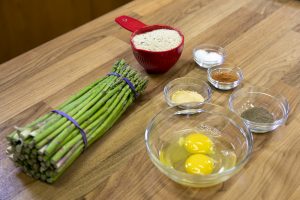Why Asparagus is among the world’s healthiest foods
In August, it featured in WebMD’s list of “12 Powerhouse Vegetables You Should Be Eating”. And in December, a nutritionist listed it as one of “15 of the Healthiest Vegetables You Can Eat” in a Good Housekeeping article. Asparagus is even okay with the keto crowd, who welcome the fact it is filling, highly nutritious, and very low carb. Furthermore, it is also low in saturated fat, very low in cholesterol, fibre-rich and low-calorie to boot. A 100-gram serving of cooked, boiled, drained asparagus (hereafter referred to as cooked) delivers only 22 calories, with carbohydrates contributing two-thirds of that energy, protein just over a quarter and fat the remaining 8%. In terms of weight, the vast majority of asparagus – over 92% – is water, 2.4% is protein, and 0.2% is fat (total lipids). While total carbohydrates account for 4.1%, 2% of that is fibre and just 1.3% simple sugars. Read on to find out what else makes this versatile vegetable so beneficial.
Asparagus is packed with various vitamins and minerals

Based on data from the U.S. Department of Agriculture (USDA) Nutrient Data Laboratory, a 100g cooked serving of this popular vegetable is an excellent source of Vitamin K, delivering 63% of the recommended daily value (DV). According to the UK National Health Service (NHS) website, Vitamin K refers to a group of fat-soluble vitamins that the body needs for blood clotting and helping wounds to heal, and there’s also some evidence it may help keep bones healthy. Asparagus is also high (37% DV) in folate (Vit B9), which the NHS says helps the body form healthy red blood cells and reduces the risk of birth defects called neural tube defects in unborn babies. Folate, and other B group vitamins, play a role in maintaining a healthy blood level of homocysteine, high levels of which are associated with increased risk of heart attack and stroke. A 100g serve of asparagus also delivers 20% of the DV for Vitamin A, as well as 13% for Vitamin C, Thiamin (Vit B1) 11%, Riboflavin (Vit B2) 8%, Vitamin E (7%), Niacin (Vit B3) 5%, Vitamin B6 (4%) and Pantothenic Acid (2%). Vitamin C is just one of the factors in the antioxidant properties of asparagus. Antioxidants neutralise free radicals – the chemical by-products that harm cell membranes and damage DNA.
Asparagus also a good source of essential minerals
Cooked asparagus also makes a valuable contribution to the dietary intake of necessary minerals, providing 9% of the DV of Selenium, 8% each for Copper and Manganese, Potassium 6%, Iron and Phosphorus 5% each, Zinc 4% Magnesium 3% and Calcium 2%. The NHS says Selenium helps the immune system work properly, as well as in reproduction. It also helps prevent damage to cells and tissues. Potassium, meanwhile, can be of particular value to people with hypertension, given high dietary potassium is associated with a decrease in blood pressure, particularly in the presence of a high-sodium diet. The NHS says Potassium helps control the balance of fluids in the body – one of the reasons asparagus is often touted as an anti-bloating superfood – and also helps the heart muscle work properly. In regard to the minerals in asparagus, it’s interesting to note they are most concentrated in the upper sections of the spears.1 It is also worth noting that green asparagus contains relatively higher nutritional components than white asparagus.2
Compounds with antioxidant & anticarcinogenic properties
Asparagus also contains a range of bioactives – compounds with actions in the body that may promote good health. Among these are flavonoids and other phenols which have been of particular interest to researchers for their antioxidant and potential anticarcinogenic properties. Rutin, an important flavonoid in asparagus, is one of the best natural antioxidants, but it has low bioavailability. It is, however, used in food including as a preservative and stabiliser. Other flavonoids in asparagus include tannin, anthocyanin, quercetin and kaempferol. According to At WHFoods3, quercetin is one of the best-researched flavonoids in nutrition, and its intake has been linked to reduced risk of numerous cardiovascular diseases as well as other chronic health problems. A study in Japan found asparagus was the most important dietary source of quercetin (following onions) for people living near Hokkaido. Also found in asparagus are sulphur-containing compounds (S-compounds), one of which, Asparagusic acid, has been reported as being unique in asparagus and of strong interest for its pharmacological and flavour properties. (Some S-compounds have also been highlighted as being major contributors to the distinctive urine odour following asparagus consumption.)

Still much to learn about Asparagus
Asparagus also contains steroidal saponins, often associated with medicinal properties, including improving the health of rats on a high-cholesterol diet. These compounds are also linked to the characteristic bitter taste of asparagus. While this article spans benefits of eating asparagus spears, it’s worth remembering that for centuries, other parts of the asparagus plant – such as roots and sprouts – have also been used in traditional medicine, particularly in Korea and China. There are even references to its use in ancient Greek and Roman times both for food and herbal medicines. And while A. officinalis is the commercial variety, various of the nearly 300 species in the genus Asparagus have been used for health reasons. Despite all this, there is still much to learn about the impact of asparagus on human physiology after ingestion and how best to store, cook and otherwise optimise its nutritional and flavour properties.
What Britain says about health & its asparagus
British asparagus is packed full of goodness, so not only are you getting a delicious vegetable but a healthy one too:
Eating asparagus promotes healthy bacteria in the large intestine and can help reduce bloating
Asparagus contains vitamin K, essential for healthy blood clotting
It is a rich source of vitamin C, which boosts your immune system
Asparagus is a mild diuretic and is believed to help detoxify the body
source: enjoyasparagus.com























